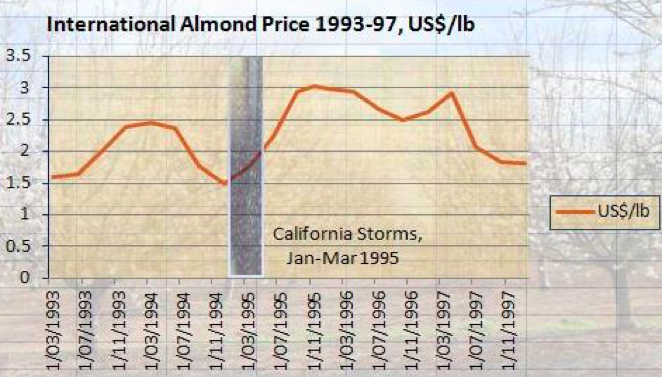California: From drought to deluge

Goldandrevolution.com
California has been pummelled by a deluge of wet weather over the past couple of months. A downpour in February followed on from one of the state's wettest Januaries in history, leading to the well-publicised crisis at the Oroville dam in the North of the state.
Prior to the most recent storms, the US National Weather Service Forecast Office warned that parts of California would experience the strongest storms in six years, and possibly even as far back as 1995 or 2004.
This wet weather is certainly a change of scenery for the Golden State: California has baked under years of drought, and as a major agricultural producer this had resulted in supply pressures for a number of agricultural commodities, most notably nuts.
Given this, a casual observer could easily -and mistakenly- assume that this deluge of wet weather would have to be good news for California's agriculture industry, and some Australian Agriculture analysts have at times similarly fallen into the trap of analysing agriculture stocks through an overly simplistic equation, with wet weather equating to good news, and dry weather equalling bad.
However, the view of those who have any familiarity with the growing of plants might be a little more circumspect. Wet weather can lead to a myriad of problems for farmers, and this is especially so for growers of tree-crops.
Heavy downpours of rain can inundate orchards, making trees vulnerable to fungal diseases and adversely impact crop yields. Excessive precipitation can also transform orchards into swamps, disrupting operations by bogging down farm machinery; and excessive wind and rain can be particularly harmful to bee pollinated crops such as almonds, as these conditions can disrupt the pollination process and lead to reduced yields.
The impact of extreme weather may be even more severe in the wake of a drought, such as that recently experienced by California, as the weakened conditions of the trees may leave them more susceptible to invasive insects and fungal diseases.
In short, for Californian tree-crop growers, too much water is bad news, and the notion that the flooding rains might prove an elixir for the drought in California is not entirely unlike a doctor suggesting to a patient that the remedy for a frostbitten leg is to stick it over the BBQ.
One of California's largest agricultural exports is almonds: the state produces around 80% of the world's almonds, and so the almond price is particularly sensitive to the weather in California. As such, the almond price could be viewed as a proxy for the impact of the weather on agriculture in California.
This makes the almond price an interesting test-case: Does extreme wet weather in California, such as that we have seen so far this year, impact the supply of almonds and push up the price?.
The US National Weather Service has likened the recent California storms to those that which hammered the state in early months of 1995, and the image below highlights the impact of this disaster on the almond price.
The following chart shows the nonpareil almond price, in US dollars per pound, during the mid 90s.

Source: Select Harvests Result Presentation, 25/08/2004
Starting from January of 1995, the almond price pushed upwards, rising from a low of $1.5 dollars per pound at the start of the year, and reaching around $3 per pound before the year was out.
There is little doubt that the doubling of the almond price in 1995 was largely due to the impact of the storm on Californian agriculture, as is evident from a quick glance over contemporary news reports.
It is important to emphasise that at this point in time, the full extent of the damage across California is unclear, and it is possible that the current bout of inclement weather may not be anywhere near as devastating as the 1995 disaster.
So far, there are some indications that the wild weather last month may have resulted in some disruption to the pollination process in California’s almond orchards, with the most ferocious storms hitting just after the almond bloom commenced in mid February. There are also some concerns that the warm and wet conditions during the bloom may provide an ideal environment for fungal growth, potentially reducing the yields of infected trees.
The extent to which the work of the pollinator bees has been disrupted by wild weather will be better understood in April, when growers first get a chance to evaluate the trees nut-set.
Schadenfreude stocks: Winners from Californian woe
Assuming the inclement weather in California this year inflicts damage that is in any way comparable to the 1995 storms, there are three Australian stocks that would stand to benefit: Select Harvests, the Rural Funds Group, and Webster.
On some valuation measures, at the time of writing it would appear that the possibility of a weather-related disruption to Californian agriculture is not sufficiently being factored into the share price of these stocks.
The table below shows the approximate Price-to-Book Ratio of the three companies mentioned above, as well as that of another listed Australian horticultural company, Costa Group (CGC).

*As at 7/3/2017
It is curious to observe the wide gulf between the valuations of Costa and the others, as operationally, Costa, Select and Webster are not too dissimilar. The wide divergence between Costa and these other companies might simply be down to the fact that Costa has recently caught the attention of the market.
This might suggest that if this bout of wet weather in California proves to be even a fraction as devastating as the storms of 1995, there could be quite significant upside potential for this trio of horticultural companies.
Select Harvests (SHV) is an Australian almond grower, and as such it is the most obvious beneficiary from any damage or disruption to the Californian almond industry.
The Rural Funds Group (RFF) is a diversified agricultural REIT, with half of the company revenue generated from almond orchards. Select Harvests is one of their tenants, another is the horticultural arm of the international agri-business giant, Olam International.
Finally, Webster (WBA), Australia's largest grower of walnuts, could also be a beneficiary from any Californian woes. In addition to being the largest grower and exporter of almonds worldwide, California is also the largest exporter of walnuts, and so it is likely that any problems in California will also impact on the walnut industry. According to some reports, many walnut orchards in California are underwater as a result of the recent downpour, possibly leaving the plants vulnerable to root disease.
Tree-nut prices tend to move together, so if the almond price were to rise as a result of California’s ills, this would likely boost the price of other nuts varieties, including walnuts.
The weather conditions California has experienced over the past month are far from ideal for horticulture, and this is particularly the case for California’s almond orchards. While it is not yet clear if the impact of the current extreme weather will be comparable to that of 1995, if the impact is anything like the storms of that year, the share-price of the three aforementioned horticulture stocks could enjoy considerable upside. As such, it may be wise to keep an eye on California as the floodwaters recede: it may emerge that the impact of the wild weather has been greater than is being currently appreciated.
Note: this article is speculative in nature and so as always, do your own investigation into the stocks mentioned here before committing to any course of action. The original report, with links to all attributions/references, is attached here: (VIEW LINK)
Disclosure: the author owns shares in Select Harvests
1 topic
3 stocks mentioned

Expertise
No areas of expertise

Expertise
No areas of expertise
